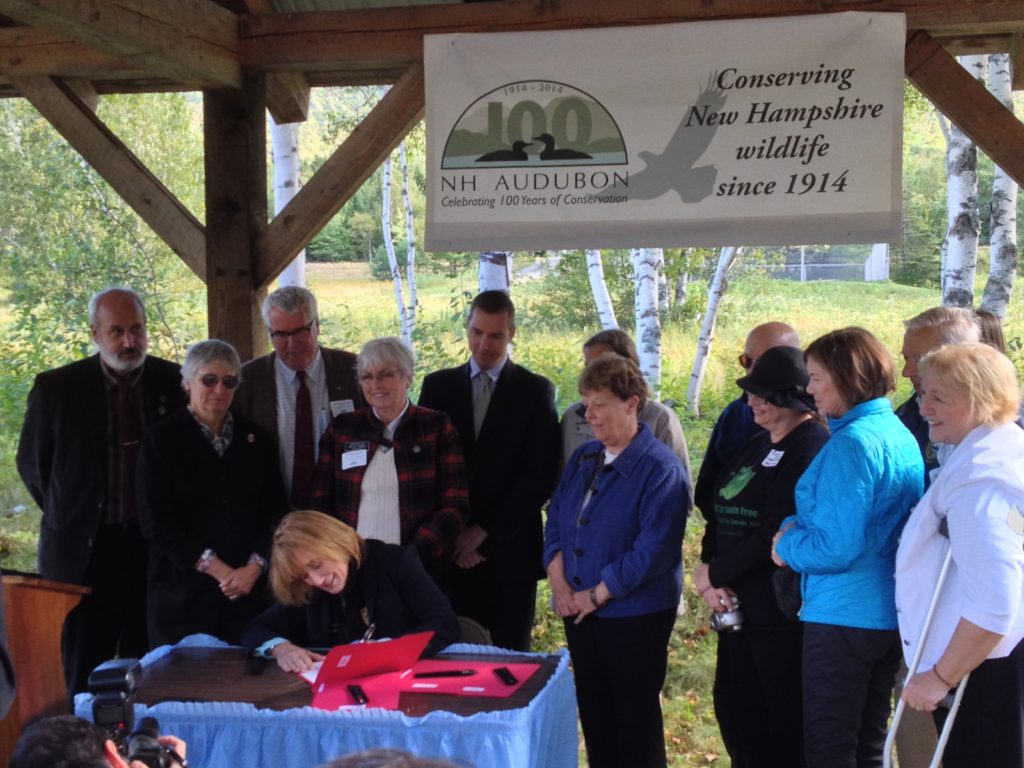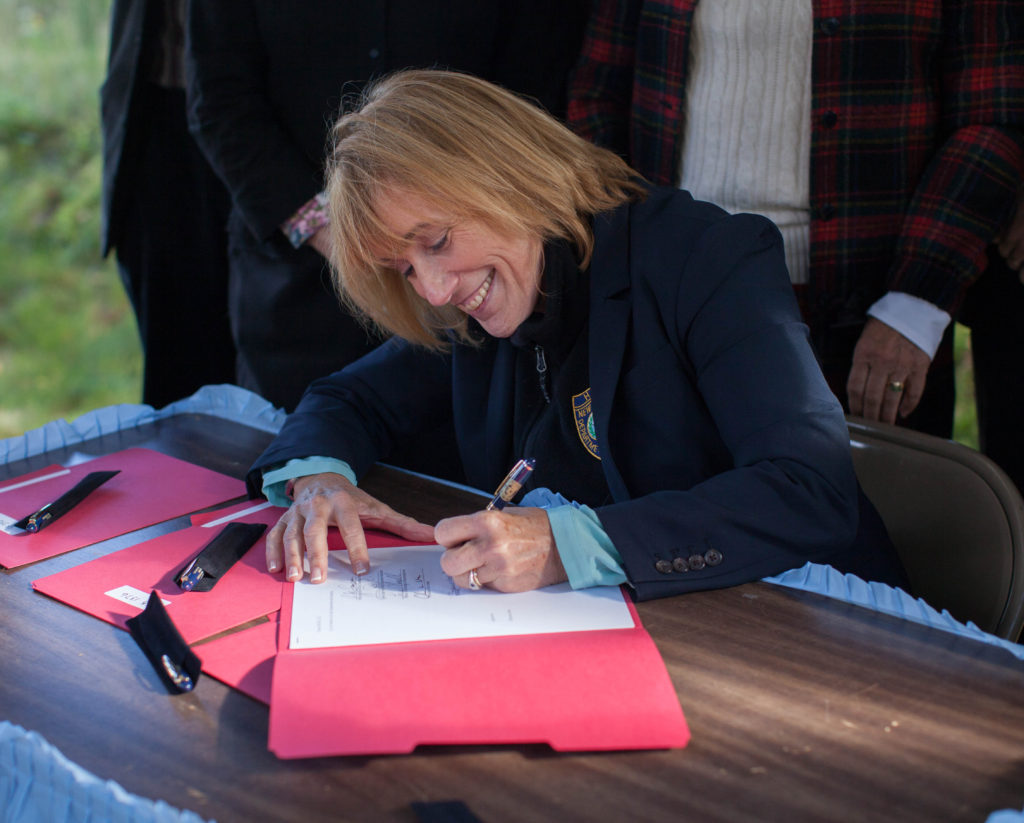Press Release
In Randolph, Gov. Hassan Ceremonially Signs Oil Pipeline Spill Preparedness, Inspection, and Study Bills
Ceremony Includes Bills’ Prime Sponsors, Co-sponsors, and Dozens of Supporters
(Randolph, NH) – Today (9/12) Governor Maggie Hassan signed three bills improving New Hampshire’s safeguards against a pipeline oil spill. The bills respond to growing concerns about risks posed by aging oil pipelines crossing the state’s North Country and the likelihood that those pipelines may be used to pump diluted bitumen (dilbit, or tar sands crude) from Montreal to Portland, Maine.

Gov. Maggie Hassan signs SB 325, HB 1224, and HB 1376 surrounded by legislators and volunteers who supported the bills. From left to right, directly behind the Governor, are Carol Foss, NH Audubon Conservation Director; Senator Jeff Woodburn (D-Dalton), SB 325’s prime sponsor, Rep. Marcia Hammon (D-Whitefield), HB 1376’s prime sponsor; and Sheridan Brown, NH Audubon Legislative Coordinator. DEBRA BROWN PHOTO.
With the White Mountains as a backdrop, Governor Hassan, Senator Jeff Woodburn (D-Dalton), many of the bills’ other sponsors and co-sponsors, and representatives from New Hampshire Audubon were joined by a large crowd of local conservation volunteers at the Durand Lake Recreation Area in Randolph, which sits along the pipelines’ route.
Senate Bill 325, sponsored by Sen. Jeff Woodburn (D-Dalton), provides the New Hampshire’s Department of Environmental Services with rulemaking authority to impose state-level spill preparedness and response requirements upon oil pipeline operators.
House Bill 1224, sponsored by Rep. Bill Baber (D-Dover), directs the state’s Public Utilities Commission to seek certification and funding from the federal Pipeline and Hazardous Materials Safety Agency (PHMSA) to oversee oil pipeline inspections in the state rather than PHMSA. This would allow more frequent inspection than is currently done by PHMSA, which has only 135 agents tasked with overseeing 2.6 million miles of pipeline.
Finally, House Bill 1376, sponsored by Marcia Hammon (D-Whitefield), establishes a legislative committee to study the safe delivery of oil and gas, including natural gas and propane, throughout the state of New Hampshire.

Gov. Maggie Hassan signs SB 325 at the ceremonial bill signing held Friday afternoon in Randolph, New Hampshire. MEG BROWN / MEGABUG PHOTOGRAPHY PHOTO
Complete list of SB 325 and HB 1224 Sponsors and Cosponsors:
SB 325 and HB 1224 enjoyed broad bipartisan support. Sen. Jeff Woodburn (D-Dalton) is SB 325’s prime sponsor. Rep. Bill Baber (D-Dover) is HB 1224’s prime sponsor. Rep. Marcia Hammon (D-Whitefield) is HB 1376’s prime sponsor. Co-sponsors are as follows: Senators Jeb Bradley (R-Wolfeboro, HB 1224); Martha Fuller Clark (D-Portsmouth, SB 325, HB 1224, and HB 1376); Bob Odell (R-New London, SB 325); John Reagan (R-Deerfield, SB 325); David Watters (D-Dover, SB 325 & HB 1224); and Representatives Bob Backus (D-Manchester, HB 1224); Karen Ebel (D-New London, HB 1224); Susan Ford (D-Easton, HB 1376); Linda Lauer (D-Bath, HB 1376); Linda Massimilla (D-Littleton, HB 1376); Marcia Hammon (D-Whitefield, SB 325); Catherine Mulholland (D-Grafton, HB 1224); David Murotake (R-Nashua, HB 1224); Beatriz Pastor (D-Lyme, HB 1224); Larry Rappaport (R-Colebrook, HB 1224 and HB 1376); Mario Ratzki (D-East Andover, HB 1376); Leon Rideout (R-Lancaster, HB 1376); Ian Raymond (D-Sanbornton, HB 1224 and HB 1376); Marge Shepardson (D- Marlborough, HB 1224 and HB 1376); and Suzanne Smith (D-Hebron, SB 325 and HB 1224).Governor Hassan said:
“Our natural resources are critical to our economy and our high quality of life, defining us as a place and as a people. By strengthening our ability to respond to oil spills, these bills will improve emergency preparedness and help protect our natural treasures. I thank Senator Woodburn, legislators from both parties and advocates like New Hampshire Audubon for their efforts on this important legislation, and I am proud to have signed it into law.”
Senator Woodburn said:
“SB 325 is the most important environmental legislation passed during the 2014 session. It is a major shift to give local control to New Hampshire to plan its own response to potential pipe line oil spills rather than rely on inadequate federal protections. We know the threat and have seen the damage of pipeline spills elsewhere. This bipartisan bill puts us at the forefront of action as one of the first states to act on this issue.”
Carol Foss, New Hampshire Audubon’s Conservation Director said:
“NH Audubon is tremendously grateful to Governor Hassan, Senator Woodburn, and the broad coalition of legislative champions who sponsored and supported these bills to protect New Hampshire’s North Country and precious natural resources against an oil spill. Large scale spills in other parts of the country have shown that tar sands crude and aging pipelines such as the Portland-Montreal Pipeline present serious risks, and we are pleased that so many answered the call to be proactive in the area of spill preparedness.”
Background on New Hampshire’s Aging Oil Pipelines
Conventional crude is currently transported from Portland, Maine to Montreal, Quebec through a 24-inch, 236-mile pipeline passing through the New Hampshire towns of Shelburne, Gorham, Randolph, Jefferson, and Lancaster. Portland-Montreal Pipe Line Company and Portland Pipe Line Company (PPLC)—subsidiaries of Exxon/Imperial Oil, Shell Oil, and Suncor—own this pipeline and a more than 60-year-old, presently idle, 18-inch pipeline alongside it.
The pipeline’s right-of-way roughly parallels U.S. Route 2 and includes more than 70 stream and wetland crossings, including the Connecticut and Androscoggin rivers.
A spill anywhere along this route would have a devastating impact on the North Country’s communities, environment, and economy. On July 25, 2010, when a 41-year-old, 30-inch pipeline owned by Enbridge ruptured near Marshall, Michigan, at least 843,000 gallons of dilbit flowed into the Kalamazoo River. An estimated 180,000 gallons of tar sands crude remain in river sediment today and ongoing cleanup efforts have cost nearly $1B.
Enbridge has expressed an interest in reversing flow on PPLC’s 18-inch pipeline (as part of its “Trailbreaker” proposal in 2008) to bring dilbit from Montreal to Portland. While PPLC suspended its portion of that project during the economic downturn in 2009, Enbridge continued to seek approval for its Canadian leg (Line 9). On March 6, Canada’s National Energy Board (NEB) approved the Line 9 project to bring dilbit from the Alberta tar sands region to Montreal The NEB’s decision, along with declining demand for traditional crude moving through PPLC’s pipeline, makes revival of PPLC’s flow reversal project a near certainty.
Transportation of dilbit greatly adds to the existing spill risk of any pipeline. Furthermore, reversing flow changes the hydraulics and pressures within a pipeline, which can hasten metal fatigue in aging infrastructure. Dilbit behaves quite differently from conventional heavy crude oil when spilled. Once released from the confines of a pipe, light hydrocarbons – used to thin bitumen enough to make it flow – evaporate into the air, creating toxic fumes that jeopardize public health. The heavy bitumen can then sink in water, coating river bottoms, smothering aquatic life, and making cleanup very costly and difficult.
###
